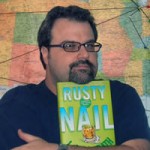Yes, it’s hard to get published. It is particularly hard if you’re trying to go the traditional route (finish your manuscript, find an agent who loves it and takes you on, get a contract with a big publishing house…or even a smaller one, etc.). Does that mean we stop trying to write? No.
Does that mean we think about self-publishing? All the experts used to give an automatic “No” to this, as well. “But the times, they are a-changing.”
Several days ago, I quoted Garrison Keillor at length about how the excellence of publishing as we know it is doomed because of the flood of self-published works hitting the marketplace, thanks to e-reading devices like the Kindle, the Nook, and now the iPad.
Of course, that is one man’s opinion. It is true that more and more people are writing today, given the easing of the process both of writing (thanks to the personal computer, which is not to say that writing is ever easy) and of publishing (thanks to the growth of self-publishing companies and POD companies and, mostly, Amazon).
What is strange is that fewer people are reading, yet more people are writing. That fact, in and of itself, probably lends credence to Keillor’s argument. Anybody can write (or, at least, pretend to write), but you have to be a great reader to be a good writer. But that is a topic for another day.
Today, I wanted to spread some of the good news for those of us struggling for the publishing industry’s seal of approval. Two weeks ago today, Publishers Weekly put out an article by Rachel Deahl, entitled “Agents Weigh the Growth of Alternate Publishing Options.” You can read the entire article here, but I wanted to zero in on some interesting new developments she mentioned toward the end of the piece.
She wrote the piece in response to a recent situation: Midlist crime novelist J.A. Konrath decided self-publishing was the way to go for his latest novel and inked a deal with AmazonEncore to that effect. The big news here is that Amazon is moving from the retail side and becoming a publisher, as well. Barnes & Noble has also announced a new self-publishing unit. What are we going to see next? Costco Publishing?
You might be tempted to overlook these moves, except that some of the industry’s most influential players–the agents who shepherd books to the big publishers–are now beginning to see the writing on the wall. One who wished to remain anonymous said:
It’s not necessarily clear that big corporate publishing is well structured to help low midlist authors with rapidly reducing print runs in an environment in which overall print sales are falling week by week. I think what Joe [Konrath] did is valuable in that he saw there was an opportunity to create low-priced content and bypass the system…what’s new here is the means.
The article notes a couple of other agents who are obviously scrambling to best take advantage of the burgeoning manuscript market.
Scott Waxman of Waxman Literary has created a separate company, Diversion Books, that is similar to AmazonEncore. He describes it as “somewhere in between the big houses and the lonely road of self-publishing.” It doesn’t pay advances, but it also doesn’t take in everyone who comes in with a manuscript. In other words, there is definitely a level of quality control. And while it may not pay you bucks up front as an author, it will give you the kind of publishing support the big houses provide.
Ted Weinstein, of Ted Weinstein Literary Management, is now reviewing the self-publishing option with all of his clients, to make certain they’re getting their books published in the smartest (meaning, the most lucrative) way. He said:
Authors can now be more self-possessed. [They can go with] a major house, an agency, or one of the turnkey services from a major retailer, whether it’s a Lulu, Blurb, Amazon, or now B&N.
In the concluding words of Rachel Deahl:
While Weinstein doesn’t see corporate publishing going away, ever, he does think the business is at “an enormous transition point” and that the outsourcing major publishers have been doing for years–forcing agents to do more editing, going with outside PR, telling authors they need to take hold of their own marketing–will mean that more agencies, and others, will jump into the publishing fray.
Any way you look at it, I believe our uphill battle as writers is leveling out a bit.
Originally posted 2010-06-07 11:10:37.



